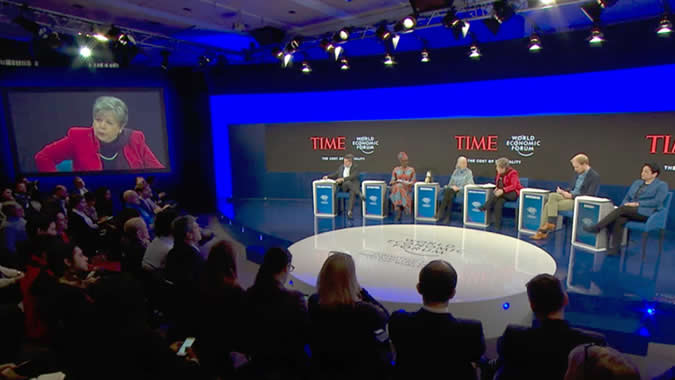Inequality is Inefficient, Self-Perpetuating and Permeates the Productive System, Alicia Bárcena Affirms at Davos Forum
ECLAC’s Executive Secretary participated in various sessions of the 19th edition of the World Economic Forum in Davos, the central theme of which was Globalization 4.0.

Inequality is inefficient, it perpetuates itself and permeates the productive system. In contrast, equality is not only an ineluctable ethical principle but also a variable that explains the efficiency of the economic system in the long run, Alicia Bárcena, Executive Secretary of the Economic Commission for Latin America and the Caribbean (ECLAC), said during the World Economic Forum 2019, which concluded today in Davos, Switzerland. The issue of inequality was present in the majority of debates.
The senior United Nations official participated during the week in various sessions of the global Forum, where she addressed political transformations in Latin America and the Caribbean and the need to rebuild societal trust with citizens of the region, the state of multilateralism and global governance, and the progress made toward fulfilling the 2030 Agenda, among other matters.
“Equality is an indispensable requirement for sustainable development. ECLAC has proven with numbers that without equality, economies are inefficient, and they achieve lower levels of productivity and investment,” ECLAC’s Executive Secretary sustained while speaking at a session on The Cost of Inequality, held today in Davos.
The other participants on this panel, in addition to Alicia Bárcena, included Winnie Byanyima, Executive Director of Oxfam International; Shamina Singh, President of the Mastercard Center for Inclusive Growth; Rutger Bregman, a Dutch historian and writer; and Jane Goodall, founder of the Jane Goodall Institute. The session was moderated by Edward Felsenthal, Editor-in-Chief of Time magazine.
In the framework of her presentation, ECLAC’s Executive Secretary added that “equality, productivity and democracy are complementary strategic goods and not substitutes for one another, even more so in a world with sharp economic, political and environmental tensions.”
She added that in the report The Inefficiency of Inequality, published in May 2018, ECLAC confirms that inequality hinders an increase in the consumption capacity of lower-income populations and, therefore, in the demand for goods and services, sapping vitality from economies. Inequality also sows the seeds of discontent and social and political instability, which also end up affecting the economy in countries.
Alicia Bárcena specified that the existence of an inverse correlation between productivity and inequality, in which low levels of share of wages in income are associated with lower investment rates, is one of the pieces of evidence showing that inequality hinders development.
Another piece of evidence lies in the unequal distribution of wealth, the figures for which are worrisome in Latin America and the Caribbean. As an example, she cited the cases of Chile, Mexico and Uruguay, countries where the concentration of wealth benefits 20% of the population, in the first two cases, and 30%, in the third.
The senior United Nations official underscored that social spending as well as policies that tend to combat tax evasion and avoidance, which costs the region $320 billion dollars each year, are effective instruments for redistributing wealth.
“Equality and inequality are associated with the elite and the culture of privileges, meaning that they are linked to those who are exempt from or who elude taxes, those who can elude the law. This naturalizes inequality,” she warned.
“We must have compassion, solidarity and equality,” she stated.
ECLAC’s Executive Secretary also stressed the urgency of changing the development paradigm by moving toward sustainable production and consumption patterns, with decent work and entitlement to rights, as the 2030 Agenda for Sustainable Development sets forth.
Previously, Bárcena participated as moderator of the panel Rebuilding Societal Trust in Latin America, where she highlighted the need to put an end to the culture of privilege and impunity in the region, with the aim of improving citizens’ perceptions and society’s trust in institutions.
Related content
Country(ies)
- Latin America and the Caribbean
Contact
Public Information Unit
- prensa@cepal.org
- (56 2) 2210 2040